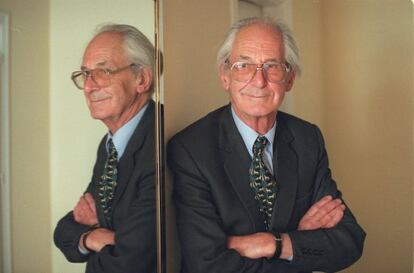Hispanist Raymond Carr dies at 96
British historian received the Prince of Asturias Award in 1999 for his work on Spain

British Hispanist Raymond Carr – who, along with the likes of Hugh Thomas, Paul Preston and John Elliot helped cover the gaps in Spanish history that homegrown academics were unable to fill in the repressive Franco years – has died at the age of 96.
Known as the Hispanist of British Hispanists, he never much cared for the description, preferring to define himself as a historian of Spain.
A leading figure in the study of 20th-century Spain, he died in the UK on Sunday, leaving behind a notable bibliography and an indelible trail of wisdom, according to his biographer, historian María Jesús González Hernández. Paul Preston also passed on news of his death during an event in Barcelona on Monday.
Carr started focusing on Spain after he was struck by the “degrading poverty” he saw visiting Torremolinos on his honeymoon in the 1950s
The author of works such as Spain 1808-1939 and Spain: Dictatorship to Democracy (the latter with Juan Pablo Fusi), he was awarded the Prince of Asturias Award for Social Sciences in 1999 for bringing “a global vision to contemporary history, which has helped to see Spanish history within its European context and has contributed to a better understanding of the Civil War and the transition to democracy.”
Carr was born in Bath in 1919 and educated at Oxford. He abandoned his studies on Sweden and started focusing on Spain after visiting Torremolinos on his honeymoon in the 1950s. Struck by a country then immersed in “degrading poverty,” he became passionate about its contemporary history, as he recalled when he received the Prince of Asturias Prize in 1999.
He told EL PAÍS at the time that his aim was to cover the gap that Spanish historians could not fill during the Franco years, adding that his work and that of other Hispanists was brilliantly continued by Spanish historians after the Transition.
In her biography, María Jesús González says Carr “was able to transform the way of writing about the history of Spain and make Spaniards see their own land as a normal country, free of any exceptional nature and essentialist romanticism.”
Tu suscripción se está usando en otro dispositivo
¿Quieres añadir otro usuario a tu suscripción?
Si continúas leyendo en este dispositivo, no se podrá leer en el otro.
FlechaTu suscripción se está usando en otro dispositivo y solo puedes acceder a EL PAÍS desde un dispositivo a la vez.
Si quieres compartir tu cuenta, cambia tu suscripción a la modalidad Premium, así podrás añadir otro usuario. Cada uno accederá con su propia cuenta de email, lo que os permitirá personalizar vuestra experiencia en EL PAÍS.
¿Tienes una suscripción de empresa? Accede aquí para contratar más cuentas.
En el caso de no saber quién está usando tu cuenta, te recomendamos cambiar tu contraseña aquí.
Si decides continuar compartiendo tu cuenta, este mensaje se mostrará en tu dispositivo y en el de la otra persona que está usando tu cuenta de forma indefinida, afectando a tu experiencia de lectura. Puedes consultar aquí los términos y condiciones de la suscripción digital.









































